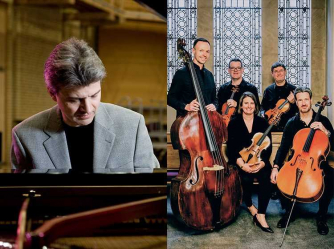Details
Cadogan Hall
5 Sloane Terrace
Sloane Square, Belgravia
London
SW1X 9DQ
England
Programme
Edward Elgar – Piano Quintet in A Minor, Op.84
John Ireland – Phantasie in A minor
Ralph Vaughan Williams – Piano Quintet in C minor
Performers
Mark Bebbington – piano
Tamás András – violin
Andrew Storey – violin
Abigail Fenna – viola
Jonathan Ayling – cello
Benjamin Cunningham – double bass
Programme Note
Pianist, Mark Bebbington, is bringing a programme of under-performed early 20th century chamber works by British composers to London’s Cadogan Hall for this afternoon concert. He will be joined by string principals from the Royal Philharmonic Orchestra to perform two major Piano Quintets: Vaughan Williams’s early work and Elgar’s from his later years. The performance opens with John Ireland’s Phantasie Trio.
"...perfect concert companions."
“I am delighted to be joining my Royal Philharmonic Orchestra friends for an afternoon of British chamber music, says Mark Bebbington. “From the early romantic fervour of Vaughan Williams to the autumnal magic of late Elgar, these two masterful Piano Quintets make perfect concert companions. John Ireland was for many years a Chelsea resident and it’s therefore particularly fitting to include his youthful Phantasie Trio - a work brimming with optimism and yearning melody.”
John Ireland’s single-movement Phantasie Trio in A Minor of 1908, dedicated to his teacher, Charles Villiers Stanford, is the first of the composer's three piano trios and was a prize-winner in the Cobbett Competition; the annual prize for works which revived the 16th and 17th century English fancy or fantasia, traditionally formed of a single movement with linked sections of varying tempi and character.
Though Vaughan Williams was a prolific composer he wrote relatively little chamber music, which makes the big-boned Piano Quintet in C minor of particular interest. Biographer Michael Kennedy suggests that the shadow of Brahms looms over the 30-minute three-movement work for piano, violin, viola, cello and double-bass, the same combination of instruments required for Schubert’s ‘Trout’ Quintet.
As Kennedy explains: “The years from 1895, when Vaughan Williams left the Royal College of Music, until 1908, when he went to Paris to study with Ravel, were in some respects the most crucial in his career because they show him struggling to find his real voice as a composer. Much of his music from the period was either destroyed or withdrawn.” This included the most ambitious of these, the Piano Quintet.
Completed in 1903, the work was then much revised, possibly on the advice of Vaughan Williams’s great friend, composer Gustav Holst, and the first performance took place at the Aeolian Hall, London in 1905. A performance has been traced as late as June 1918 after which it was not heard again until the 1990s when the work was finally published.
Elgar’s Piano Quintet in A minor, op.84 dates from the years of the composer’s later maturity and was first performed at London’s Wigmore Hall in 1919. Another substantial three-movement work of 35-minutes, for two violins, viola, cello and piano, the Piano Quintet was the largest of three chamber works Elgar composed at Brinkwells - “a simple thatched cottage” the family had rented in the Sussex countryside.
Lady Elgar noted that the inspiration for the first movement came from a group of trees in the landscape near to Brinkwells which, according to legend, were the remains of Spanish monks who had engaged in sacrilegious ceremonies and been struck by lightning. Music Critic Ernest Newman, the Quintet’s dedicatee, similarly relayed that Elgar had described the first movement as "ghostly stuff"; and it seems that his supernatural stimulus was not dissimilar to that shared by composer John Ireland when he was living in the county.
For the performance, Mark Bebbington will be joined by string principals from the Royal Philharmonic Orchestra, with whom he is a regular soloist.
Champion of British Music
Internationally recognised as a champion of British music in particular, Mark Bebbington has been at the forefront of the resurgence in performing and recording British composers for over 30 years, with complete cycles of John Ireland and Frank Bridge to his name, as well as major works by Bax, Vaughan Williams, Mathias, Benjamin Dale, Doreen Carwithen and William Alwyn, all received to unanimous critical acclaim on labels SOMM and Resonus.

 Your events at Classical Events
Your events at Classical Events

